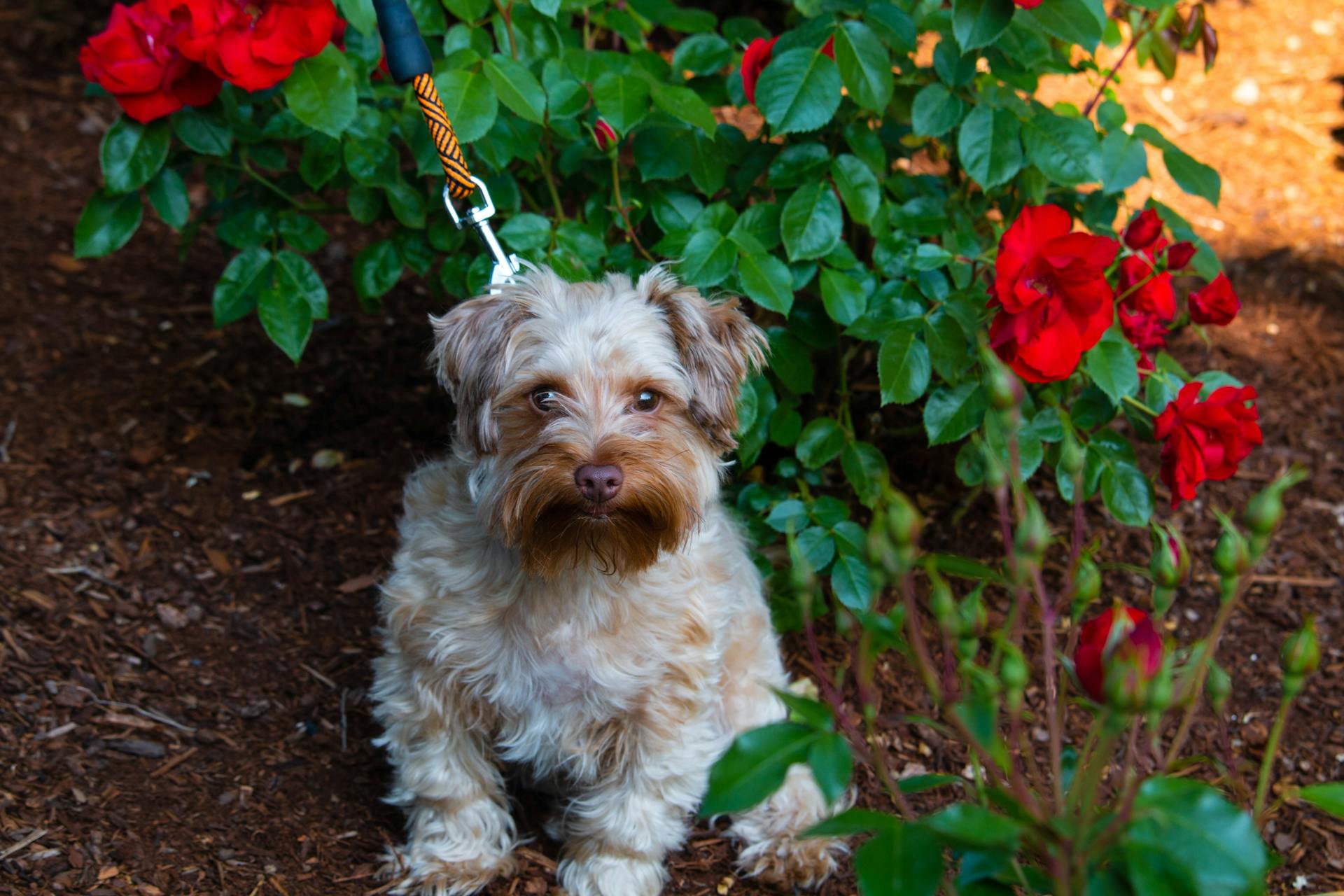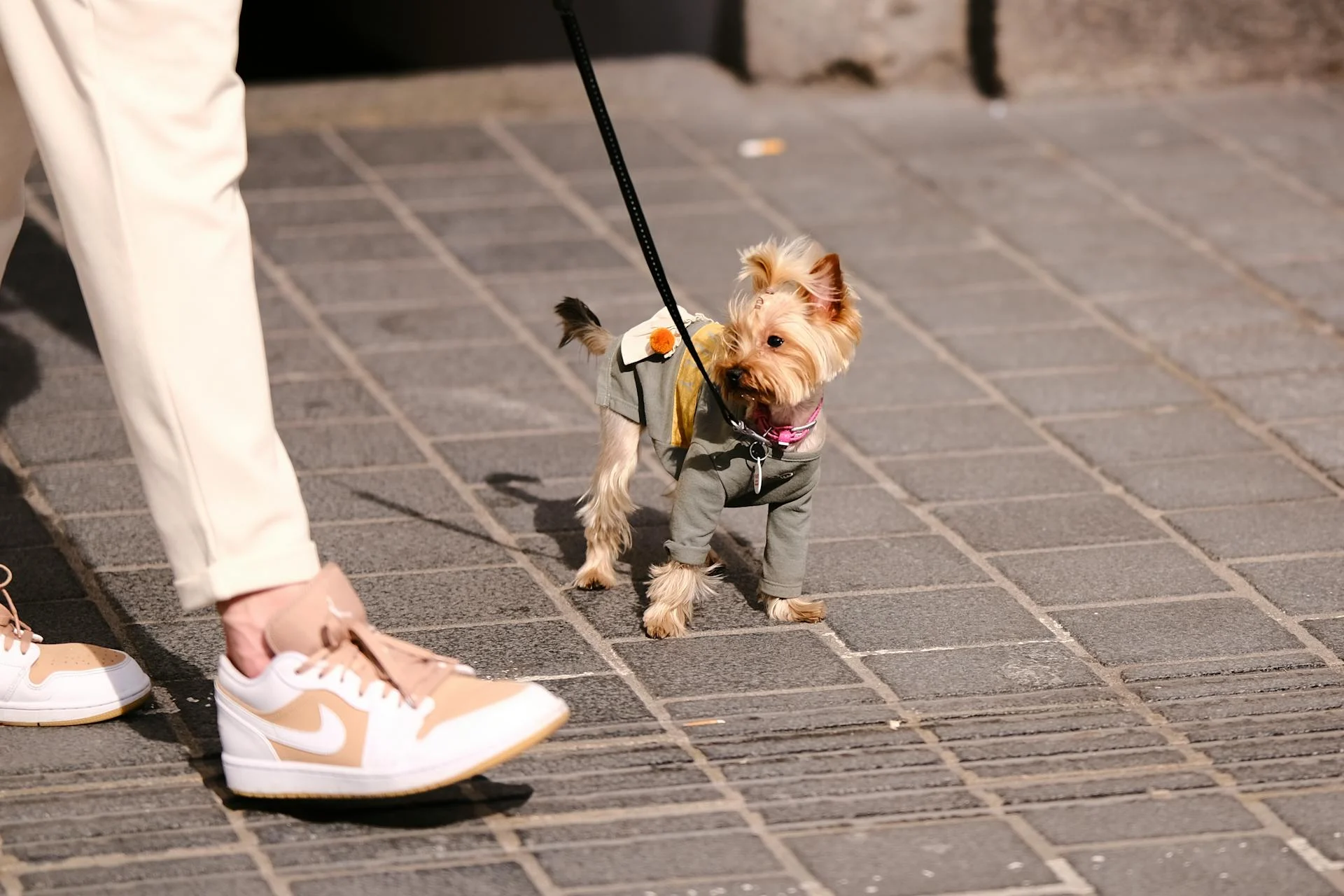
Choosing the right bark collar for your Yorkie can be overwhelming, but don't worry, I've got you covered. There are several types of bark collars available, including citronella bark collars and ultrasonic bark collars.
Yorkies are prone to excessive barking due to their high energy levels and alert nature. They need a bark collar that is specifically designed to address their unique needs.
Citronella bark collars are a popular choice for Yorkies because they are non-invasive and easy to use. They work by releasing a mild citronella spray when the dog barks.
Ultrasonic bark collars, on the other hand, use high-frequency sound waves to deter barking. They are often more effective for Yorkies that are highly sensitive to sound.
Curious to learn more? Check out: Use of a Prong Collar
Understanding Yorkies
Yorkies are known for their high energy and playful personalities, which can sometimes manifest as excessive barking.
Their small size belies their big personalities, and they can be quite loud when they want to be.
Yorkies are intelligent dogs that thrive on interaction and attention, making them prone to barking when they feel neglected or bored.
Positive reinforcement training can help reshape their behavior, teaching them to communicate in a quieter way.
Their common bark motivations include alerting their owners to potential threats, seeking attention, and expressing excitement or anxiety.
Training Yorkies
Training your Yorkie to reduce barking requires patience, consistency, and positive reinforcement training. You need to understand the motivations behind their barking, which can range from alarm barking to demanding attention.
Yorkies were originally bred to loudly bark at rats in textile mills and shops in England, so barking is deeply ingrained in their DNA. They see it as their duty to notify you of anything out of the ordinary.
To pinpoint your Yorkie's specific barking motivations, keep a diary tracking each barking episode - time, location, triggers, duration, etc. Patterns in their vocal habits will emerge, allowing you to address the root causes through positive training methods and environmental management strategies.
Positive reinforcement training can teach your Yorkie to communicate in a quieter way. Techniques include desensitizing them to common bark triggers and counterconditioning their response to associate the trigger with rewards rather than barking.
Desensitization and counterconditioning involve exposing your Yorkie to a mild version of a common bark trigger, like a recording of a doorbell at low volume, and rewarding them with calm pets and treats for quiet behavior.
Here's a step-by-step guide to desensitizing and counterconditioning your Yorkie:
- Start with a low volume recording of the trigger sound.
- Reward your Yorkie with calm pets and treats for quiet behavior.
- Slowly increase the volume of the recording as long as your Yorkie remains relaxed.
- Change their response from worked-up barking to quiet anticipation of rewards upon hearing the trigger sound.
Training a Yorkshire Terrier to bark less requires time, consistency, and loads of patience. You should notice a gradual improvement in their barking behavior over the course of weeks and months.
Tools and Options
There are several tools and options available to help curb excessive barking in Yorkies. Smart bark collars can be useful training aids if used correctly, selecting a collar that uses vibrations or citronella spray rather than shock. These collars can be used for short sessions while actively training.
Additional reading: Flea Collars Work
Interactive feeders, puzzle toys, and chews provide mental stimulation when you're gone, reducing boredom barking. Snuggle puppy toys with mimic heartbeats and warmth can soothe anxious, vocal pups, and may be tried in the crate.
Here are some of the top bark collars for small dogs:
Tools to Stop Excessive Dog Barking
Smart bark collars can be a useful training aid if used correctly, selecting a collar that uses vibrations or citronella spray rather than shock.
Some breeds are more prone to non-stop barking than others, especially smaller breeds with high energy levels that may cause them to bark more.
Bark collars are also called no-bark collars or anti-bark collars, and they're a kind of remote training e-collar that reinforce or correct a dog's behavior, such as annoying barking.
A no bark collar set includes a collar strap and a receiver that gives the stimulation, which is triggered by a dog's barking.
There are many kinds of bark collars, including electronic, spray, ultrasonic, and vibration collars, each with its own unique features and benefits.
The PetSafe Elite Little Dog Spray Bark Collar features the Perfect Bark sensor that only recognizes your dog's barking, ensuring no accidental stimulation is issued when other sounds or animals are nearby.
The PetSafe Lite Rechargeable Bark Collar is a static stimulation collar with automatically adjusting levels of correction, making it ideal for small dogs and sensitive and shy dogs.
Here are some popular bark collars for small dogs:
Remember, bark collars should be used in conjunction with positive reinforcement training and addressing root causes of barking for long-term success.
Details and Specs
The details and specs of this device are pretty impressive. The device itself is small, measuring 3″ W × 1.5″ H × 1.2″ D.
One of the standout features is the adjustable collar, which can be customized to fit different neck sizes with a length of 6–24″.

The device is also incredibly lightweight, weighing in at just 2.2 oz.
When it comes to charging, the device has a battery life of ~24 Hours standby and ~12 Hours continuous use.
The voltage is a standard 5.5 v, which is great for everyday use.
Here's a quick rundown of the device's charging specs:
The device also has some great features for outdoor use, such as water resistance with an IPX4 rating, and a durable collar made of nylon.
The light on the device is pretty handy, too – it turns blue when charging or when the collar is activated, and red when the device is powering off.
Frequently Asked Questions
Can I use a shock collar on my Yorkie?
We strongly advise against using shock collars on your Yorkie, as they can cause psychological distress, stress, and physical harm. Instead, consider positive reinforcement training methods that prioritize your dog's well-being and safety.
Can Yorkshire terriers wear collars?
Yorkshire terriers can wear collars, but it's essential to choose a collar that doesn't put pressure on their delicate neck and trachea, especially in puppies. Proper collar selection is crucial to prevent potential health issues in this breed.
Sources
- https://www.dogster.com/dog-breeds/do-yorkies-bark-a-lot
- https://www.fitwarm.com/blogs/news/train-yorkie-speak-softly-stop-barking
- https://ultimatebarkcontrol.com/products/barkwise-complete
- https://petstek.com/blogs/petstek-blog/best-bark-collar-for-small-breeds
- https://petspy.com/products/smart-dog-bark-collar-3-training-modes
Featured Images: pexels.com


